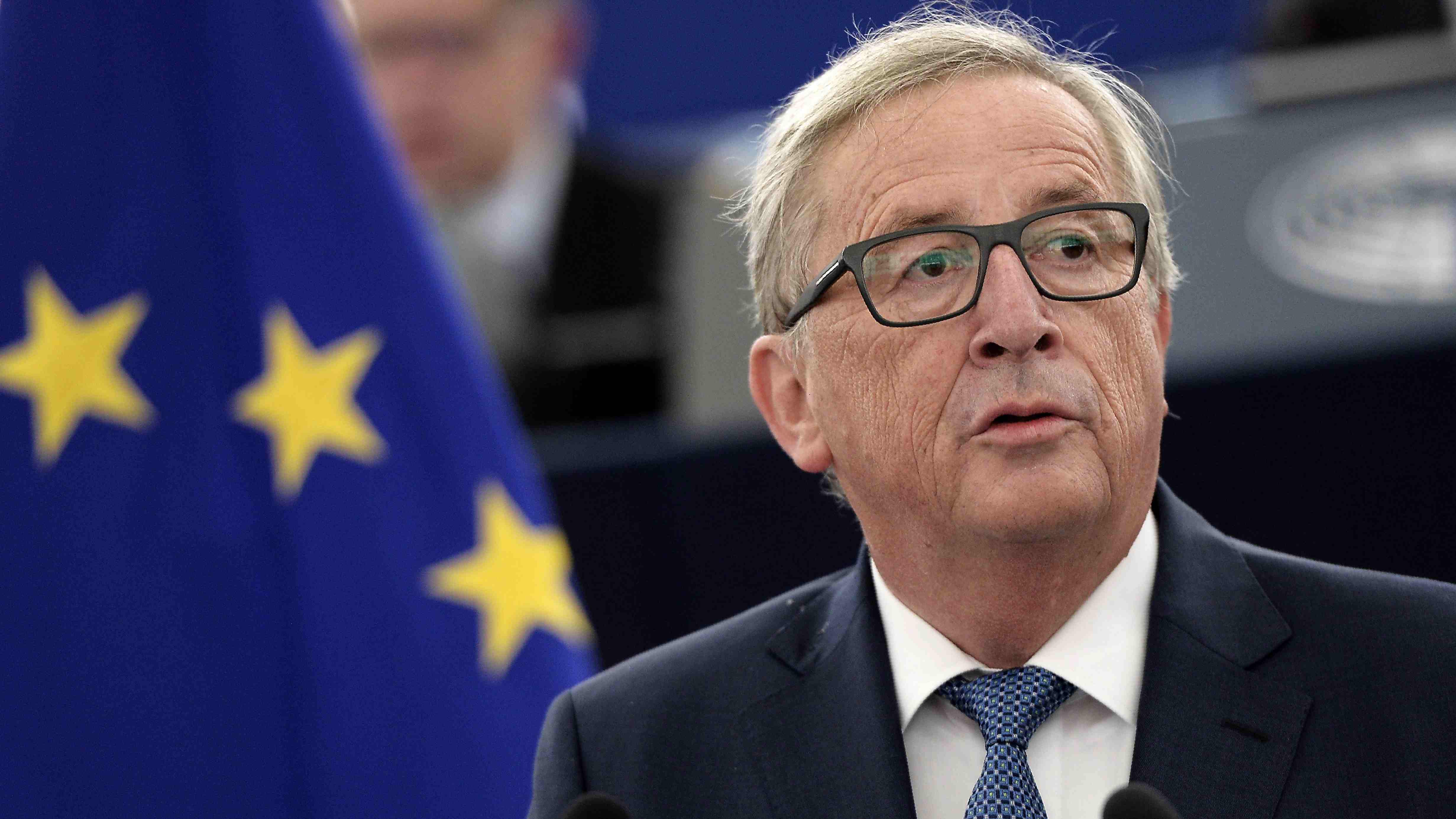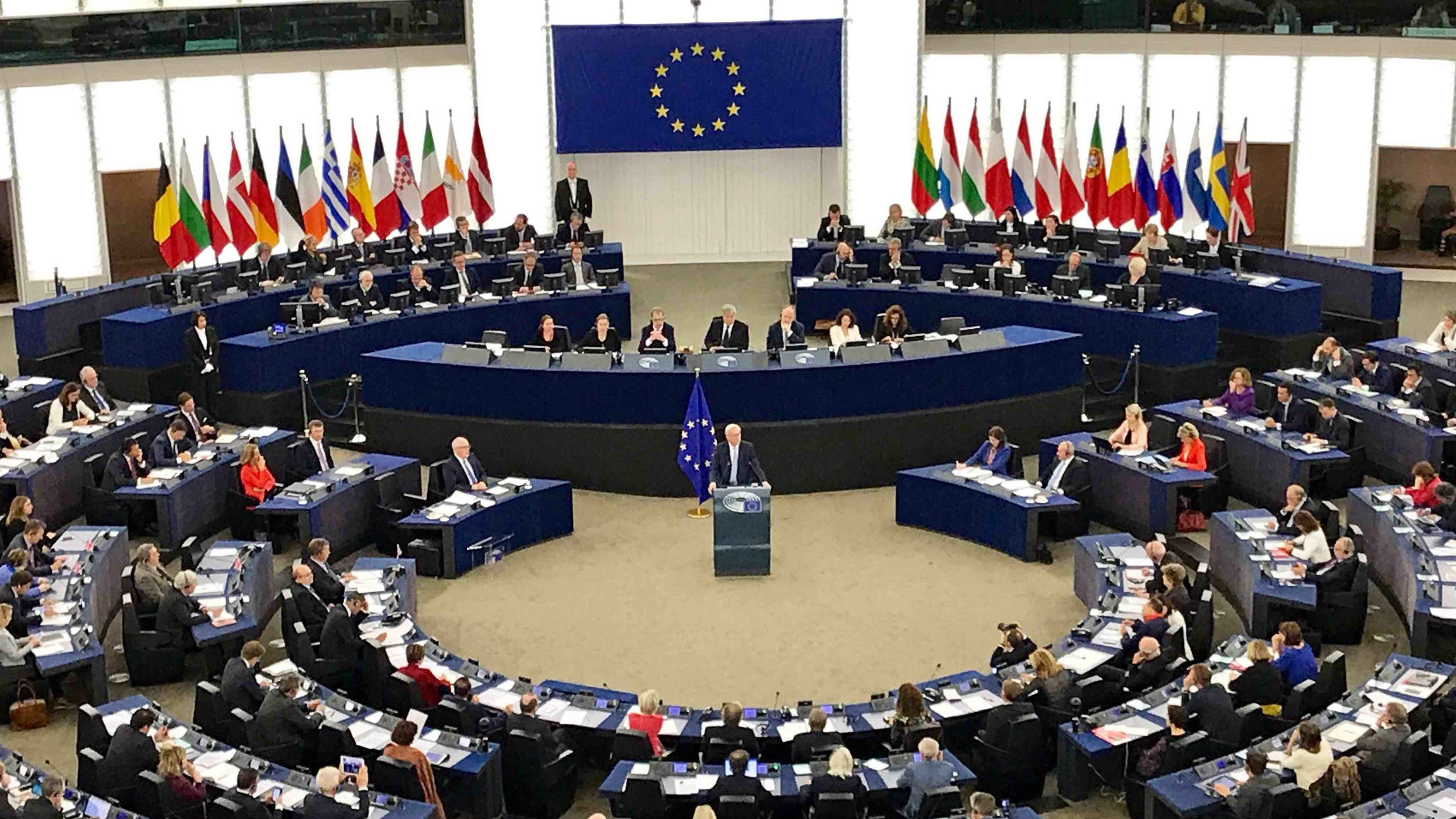
Politics
18:21, 13-Sep-2017
The State of Europe in 14 points
John Goodrich

European Commission President Jean-Claude Juncker struck a positive note on Wednesday as he delivered the annual “State of the European Union” address, labeling Brexit an opportunity to heal divisions within the bloc and bind members more closely together.
Addressing 750 MEPs in the European Parliament in Strasbourg, France on Wednesday morning, the 62-year-old former Luxembourg prime minister was able to point to a positive future -- but conceded there was "no love without disappointment."

Jean-Claude Juncker. /AFP Photo
Jean-Claude Juncker. /AFP Photo
Last year’s speech saw Juncker in fire-fighting mode, faced with debt problems, a migration crisis, and Britain’s vote to leave the EU. But with encouraging growth figures, muted populism – and some lingering tensions – Juncker declared Wednesday that the "wind is back in Europe's sails.”
"We have now a window of opportunity but it will not stay open forever. Let us make the most of the momentum, catch the wind in our sails."
- Jean-Claude Juncker, State of the Union address 2017
What is the state of Europe in 2017?
Economy
The EU's economy has struggled since the financial crisis, beset by uneven growth and mountains of debt. But in 2017 there has been a marked bloc-wide turnaround, with all 28 member countries reporting economic growth and unemployment at lows not seen since before the crisis hit.

Juncker stated that economic growth is now above two percent for the EU and at 2.2 percent for the eurozone. “Ten years after crisis struck, the European economy is finally bouncing back,” he said.
Euro minister...
Juncker was keen to press forward with French President Emmanuel Macron’s plan to appoint a finance minister for the eurozone, a figure who would speak for the 19 euro countries on financial matters, as the EU's “High Representative” now does on foreign affairs. Such a minister would also potentially step in when an individual country is in economic difficulties, Juncker said.
"We need a European Minister of Economy and Finance."
- Jean-Claude Juncker, State of the Union address 2017
The job would combine the role of EU commissioner and head of the Eurogroup of eurozone finance ministers, currently held by Dutch finance minister Jeroen Dijsselbloem.
However, Juncker appeared to move away from creating a "Treasury" - an idea backed by Macron - insisting there was no need for a separate department for the eventual finance minister.
... and a single president?
Juncker also proposed merging the presidency of the European Commission and European Council -- a post currently occupied by Donald Tusk. This would be a huge symbolic step towards deeper integration.
Europe united
Nineteen of the EU’s 28 members are currently part of the eurozone, and Juncker wants this “two-speed” approach to end. He called on non-euro countries to join the common currency and floated the possibility of offering "pre-accession aid" as an incentive. His desire to tackle an internal two-speed approach in the EU also covered the Schengen visa-free travel area, which he urged Romania and Bulgaria, among others, to join.
Block on foreign takeovers
Juncker said he would seek powers to screen foreign takeovers in Europe's strategic sectors.
"If a foreign, state-owned company wants to buy a strategic port, or part of our energy infrastructure ... this must be done transparently, with scrutiny and debate.”
Not 'naive' on trade
Trade deals with Japan, Canada and Ukraine have been inked, and Juncker announced that he wanted negotiations with New Zealand and Australia to be completed by 2019.
“We are not naive supporters of free trade."
- Jean-Claude Juncker, State of the Union address 2017
However, tensions over global trade remain. “We are not naive supporters of free exchange," Juncker said. "Europe has always got to defend its strategic interests. Europe is open to trade, yes, but there has to be reciprocity."
Integration… or division
Right-wing governments in Poland and Hungary have repeatedly squabbled with Brussels over any moves that have the potential to erode national sovereignty.
"Europe stretches from Spain to Bulgaria. Europe needs to breathe with both its lungs: the eastern lung and the western lung. Otherwise our continent will suffocate."
- Jean-Claude Juncker, State of the Union address 2017
The countries are unlikely to follow Britain out of the bloc, but a fissure with the former Communist countries in Eastern Europe will complicate plans to push further integration.
Brexit
With economic growth, the expected divorce from the UK has been dampened, but it is still the issue that could have the most profound impact on the EU's future. From trade relations, banking regulations and the future of freedom of movement, there remain more questions than answers.
"We will always regret this and I think that you will regret it as well," Juncker said, addressing British MEPs. "But we will move on, because Brexit isn't everything - it's not the be-all and end-all."
France and Germany
With Britain out of the picture, Germany and France are – in that order – the dominant powers in the EU. The election of Macron, coupled with the expected re-election of Angela Merkel as German chancellor, is expected to drive reform of the bloc over the coming five years.
Juncker sees the expected departure of Britain, often an obstructionist to closer integration, as an opportunity for deeper relations within the bloc – but not everyone is signed up.
Direct democracy
Critics have bemoaned the structure of the European Union for a perceived “democratic deficit," essentially a lack of accountability for its actions. A counter-move to this has been an uptick in national referenda, a spark in direct democracy that has the potential to undermine the EU.
Populism
Rewind one year, and a rightist populist fervor was terrifying the establishment both in Europe and around the world. Those forces have largely been tamed, if not extinguished, over the past year.
The National Front’s Marine Le Pen was defeated in France by the fiercely pro-EU Macron, center-right Mark Rutte defeated anti-Islam and anti-EU Geert Wilders, while the far-right Alternative for Germany appear to be making little headway in the final stretch of the German election.
Migration
The migration crisis caused ructions across the bloc, as millions of refugees arrived from war-torn regions of the Middle East and North Africa. The influx was seen as a threat to Europe’s cohesion, and gave rightist politicians a rallying call to match the populist mood.
So far, the EU has managed the issue without actually solving it. With the measures it has taken, divisions within the bloc have been exposed, most notably with Hungary, Poland and the Czech Republic refusing to take in any refugees. Still, Juncker insisted Wednesday that Europe would remain a “continent of solidarity”.
The number of migrants arriving in Europe has fallen over the past year, but a recent increase in arrivals from Italy is a reminder that this is an ongoing political as well as personal issue.
Turkey
Turkey currently remains on a road to EU membership, though Merkel agreed with her election rival Martin Schulz last week that those negotiations should end.
Poor relations between Ankara and Berlin could have lasting consequences for the EU, for which Turkey remains a key ally in the fight against terrorism and in the migration crisis.
Juncker said Turkey’s accession cannot be possible “in the foreseeable future.” “Stop calling our member states and their heads of government fascists and Nazis,” he added, referring to spats between Turkey and several EU states earlier this year over political rallies.
Terrorism
Terrorism, like migration, is a problem that must be addressed through global action and partnerships. A series of terror attacks have taken place in Europe over the past year, with deadly strikes in Spain, France, Germany and the UK in 2017 alone. Unfortunately, this is a challenge which Europe is struggling to contain.
7950km

SITEMAP
Copyright © 2018 CGTN. Beijing ICP prepared NO.16065310-3
Copyright © 2018 CGTN. Beijing ICP prepared NO.16065310-3